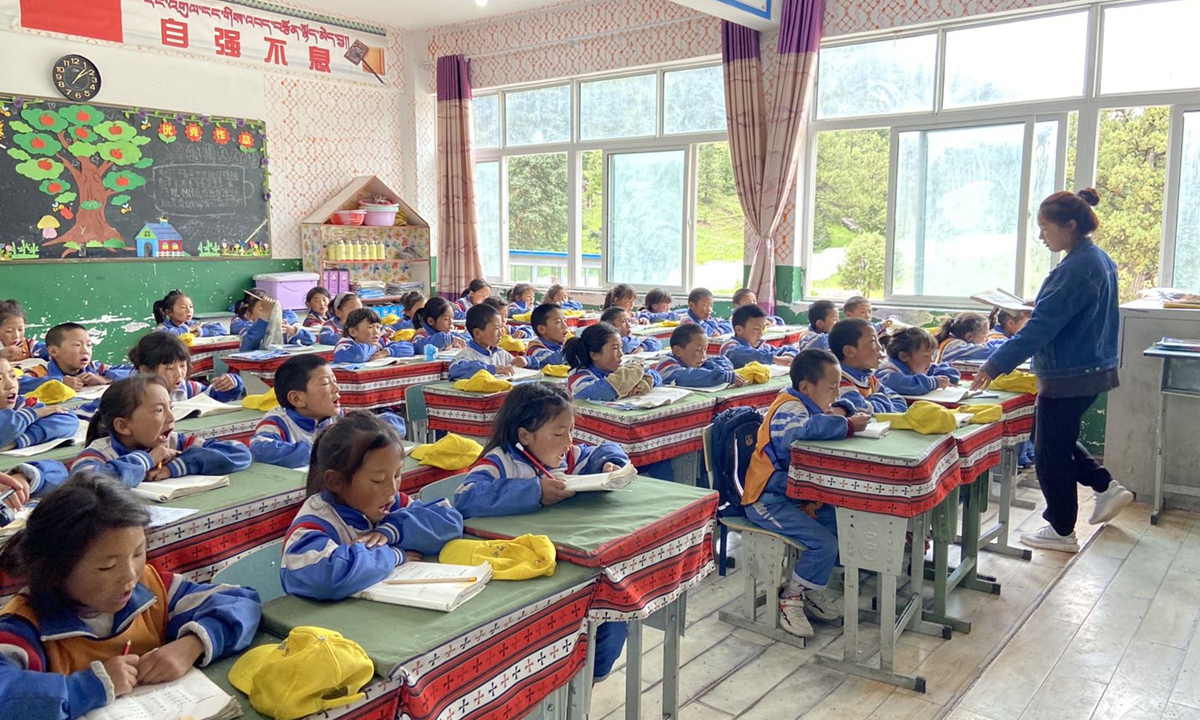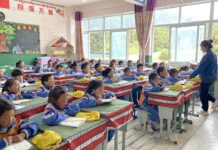
China’s language policy’s differential treatment of languages, the glorification of the dominant language, and the stigmatization of the minority languages in the context of its recent pronouncement that the teaching of Tibetan language in Tibetan schools in Tibet is unconstitutional is not only a naked violation of international law but it also cultivates seeds of animosity and dissension amongst groups impacted by such misguided policy, says Professor Nawang Phuntsog*
(TibetanReview.net, Feb15’21)
A couple of weeks ago, I became overwhelmed by two very powerful emotions. Firstly, I was filled with joyful relief upon hearing the news that Tashi Wangchuk, Tibet’s language activist par excellence, was released from prison in China. Tashi’s indomitable courage was evident when he intentionally allowed the New York Times to document his travel to Beijing in 2015 to explore legal recourse for the denial of Tibetan language instruction in his local area. Tashi made his feelings known about China’s intentions of eliminating the Tibetan language from curricula when he boldly stated, “In politics, it’s said that if one nation wants to eliminate another nation, first they need to eliminate their spoken and written language.” He further brought attention to the on-going systematic suppression of his culture. His lawyer, Mr. Liang, confirmed later that the prosecutors used these comments for justifying his imprisonment on the spurious ground that they incite “separatism.”
Hardly was I done toasting to Tashi’s release from prison when I came across a disturbing report from the Tibetan Centre for Human Rights and Democracy (TCHRD) that on January 20, 2021, the National People’s Congress (NPC), which is subservient to the Chinese Communist Party, issued a pronouncement declaring that teaching the Tibetan language in schools is “unconstitutional.” This shocking proclamation triggered the second emotion in me – a deep, heart-ripping sadness. In my three decades in academia, I have taught courses on controversial discourses on bilingual education, theories of second language acquisition, language-in-education policy, identity politics, ethnic identity development typologies, and so on, but never have I ever come across a more ludicrous, morbid, and morally-defunct statement than when the National People’s Congress (NPC) labeled the teaching of Tibetan language as “unconstitutional” as a way to justify the denial of mother-tongue education for Tibetan children in schools.
Known widely as a rubber-stamp parliament, the National People’s Congress is supposed to be charged with the function and power to review and interpret local laws and regulations. The NPC’s Legal Affairs Committee is, thus, purported to have used its constitutional provision when it declared recently, on January 20, 2021, that local provisions for minority languages were “inconsistent with the provisions of Article 19 of the National Common Language Law, Education Law, and other relevant laws” and further justified the use of Mandarin Chinese as the medium of instruction in “ethnic minority” areas. This one-size-fits-all proclamation flies in the face of the 1984 Regional National Autonomy law that provides for language rights for all minorities. The US Commission on China (1984) describes that regional ethnic autonomy is the basic policy adopted by the Communist Party of China for resolving the ethnic issue in China through its application of Marxism-Leninism.
Based on a long-recognized international law, the Permanent Court of International Justice (1935) stipulated in its Advisory Opinion that “linguistic minorities should always be entitled to their own schools where they can be taught in their own language, regardless of the general educational policies of a state” because of their vulnerability. The Handbook by the United Nations Special Rapporteur on Minority Issues (2017) affirmed that “all persons are entitled to equal and effective protection against discrimination on the grounds of language” and further clarified that “language preferences that unreasonably or arbitrarily disadvantage or exclude individuals are a form of prohibited discrimination.”
I was beyond disbelief that China’s National People’s Congress dared to make the public announcement that Tibetan mother-tongue is not allowed to be used on the baseless ground of being unconstitutional. Nobody has the right to take away this fundamental human birthright: the mother-tongue of a child. A law rejecting a child’s right to their native language must be considered profoundly unethical and reprehensible, requiring the sternest possible condemnation from all for insulting one of humanity’s long-held cherished values.
The status of languages, especially that of minority ones, can be easily discerned and understood with how the states formulate and make decisions at the macro-level. Thus, the state language policy determines the status, the corpus, and the acquisition planning in the schooling context (Cooper, 1989). Therefore, this recent pronouncement and its implementation with full possible force targeting Tibetan language instruction in schools is tantamount to “linguistic genocide,” as it effectively destroys all avenues of academic language acquisition for Tibetan children.
The Ad Hoc Committee of International Convention for the Prevention and Punishment of the Crime of Genocide (1948) stated that a cultural genocide occurs when “any deliberate act committed with intent to destroy the language, religion or a culture of a national, racial or religious group on the grounds of national or racial origin or religious belief.” The excessive suppression of Tibetan language instruction in schools is an educational anomaly and morally disconcerting in a region where 90% of the population still uses the Tibetan language. Often, the dominant language, Putonghua, is glorified by projecting it as the language of progress, modernity, and national unity, while the stigmatization of the dominated language is achieved by casting it as backward, anti-progress, anti-unity, and anti-science. China’s language policy’s differential treatment of languages, the glorification of the dominant language, and the stigmatization of the minority languages cultivate seeds of animosity and dissension amongst groups impacted by such misguided policy, and this notion is being completely overlooked and ignored.
The social, academic, and emotional benefits of education in the mother-tongue language have long been established scientifically through several studies of minority children in different parts of the world. Mounting research evidence has convincingly shown that schools must provide children with quality mother-tongue language instruction to acquire academic proficiency in the second language. Therefore, it is apparent that Tibetan children’s ability in their native language is crucial in achieving high proficiency in Putonghua and other subjects, such as mathematics and science. Suppose the Chinese officials are keenly interested in improving economic and employment conditions in the Tibetan area. In that case, two-way bilingual programs providing content and language integrated learning (CLL) must be readily available and accessible in Tibet. Political exigencies should not be allowed to hijack the long-term educational benefits of authentic bilingual education. Growing up bilingually, Tibetan children will develop a positive outlook towards bi-ethnicity, resulting in genuine appreciation for their native cultural heritage and the dominant Chinese culture.
The Handbook by the United Nations Special Rapporteur on Minority Issues (2017) cited Senegal as a success story of mother-tongue language education. It was reported that Senegal students taught in their mother-tongue language achieved a pass rate of 65 percent, compared to the national average of 50.9 percent for those taught in the official language. Another example is Tanzania, which started using Kiswahili instead of English in 2015 as the main medium of instruction in all primary and secondary education levels in recognition of the overall positive effects of education being provided in most of its children’s mother-tongue language.
Formalized and systematized in the 7th century during King Songtsen Gampo (627–650), the Tibetan language has a long and glorious history of development and expansion in Tibet. Thousands of Buddhist texts were translated into the new Tibetan language, which later became the repository of the enormous Buddhist canon translated from Sanskrit over 600 years ago. The precision of these translated works is what makes it possible to recreate lost Sanskrit texts from Tibetan language texts with unparalleled accuracy. The Tibetan language has remarkable versatility and capacity to import profound Buddhist metaphysical, epistemological, and axiological treatises into its lexicon (Phuntsog,2017).
The uniform orthography has not only allowed all literate Tibetans to share a single written language, but it has also helped maintain communication in areas where the spoken dialect may be different. The written language continues to be a useful tool for communication to this day in the vast regions of Tibeto-Burmese language speakers. Schools play a vital role in helping children acquire the skills to read and write the Tibetan language.
The recent declaration that it is unconstitutional to use the Tibetan language in schools showed the CCP’s complete bankruptcy of human decency and dignity. All right-thinking individuals should be utterly upset and shocked with the CCP’s perspectives and actions. Please join me to denounce their proclamation regarding the Tibetan language and urge the CCP to adopt an enlightened approach that will earn admiration from our global community rather than condemnation and criticism.
——–
References
1. Cooper, R.L. (1989). Language Planning and Social Change. Cambridge: Cambridge University Press.
3. http://www.npc.gov.cn/englishnpc/index.shtml The National People’s Congress of the People’s Republic of China
4. Permanent Court of International Justice (1935). Minority Schools in Albania. Advisory Opinion: Permanent Court of International Justice.
5. Phuntsog, N. (2018) Tibetan Language at Home in the Diaspora: The Mother Tongue–Based Bilingual Schooling of Tibetans in India, Diaspora, Indigenous, and Minority Education, 12:2, 82-94, DOI: 10.1080/15595692.2017.1398141
6. United Nations Special Rapporteur on Minority Issues (2017). Language Rights of Linguistic Minorities: A Practical Guide for Implementation. Geneva: United Nations Special Rapporteur on Minority Issues.
—
* Nawang Phuntsog is a Professor Emeritus of Elementary & Bilingual Education at California State University, Fullerton, USA.






